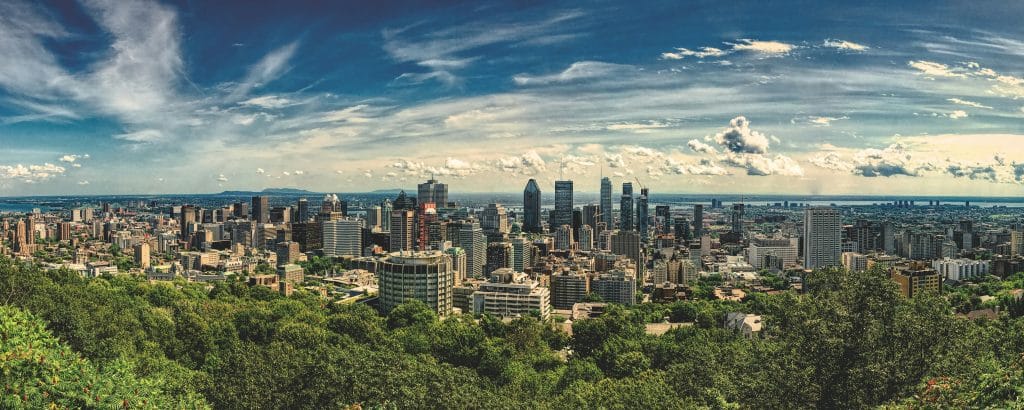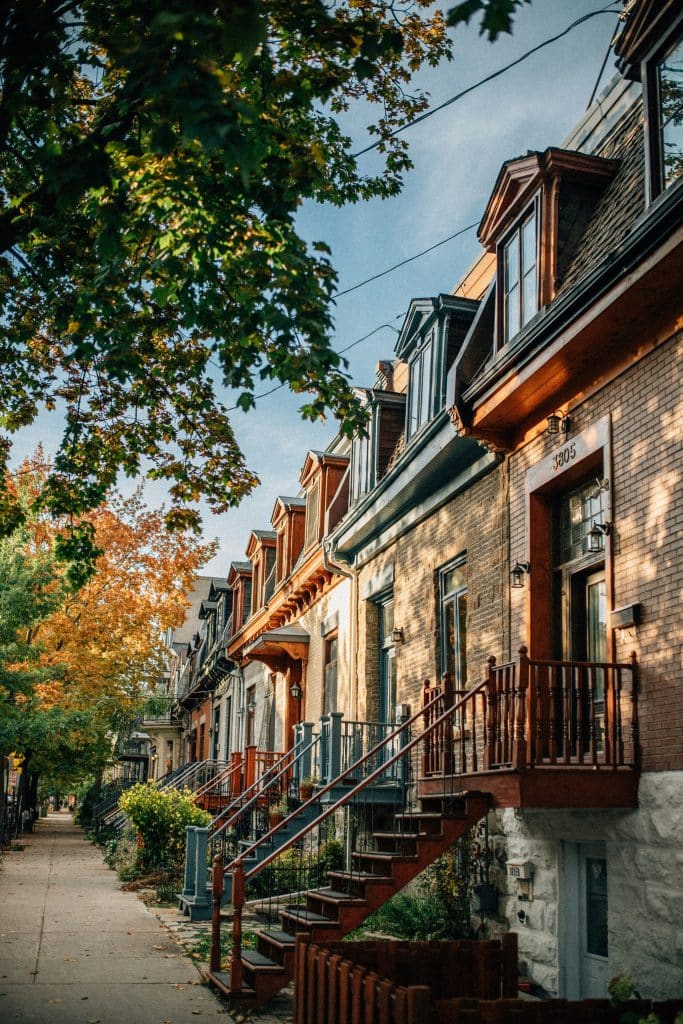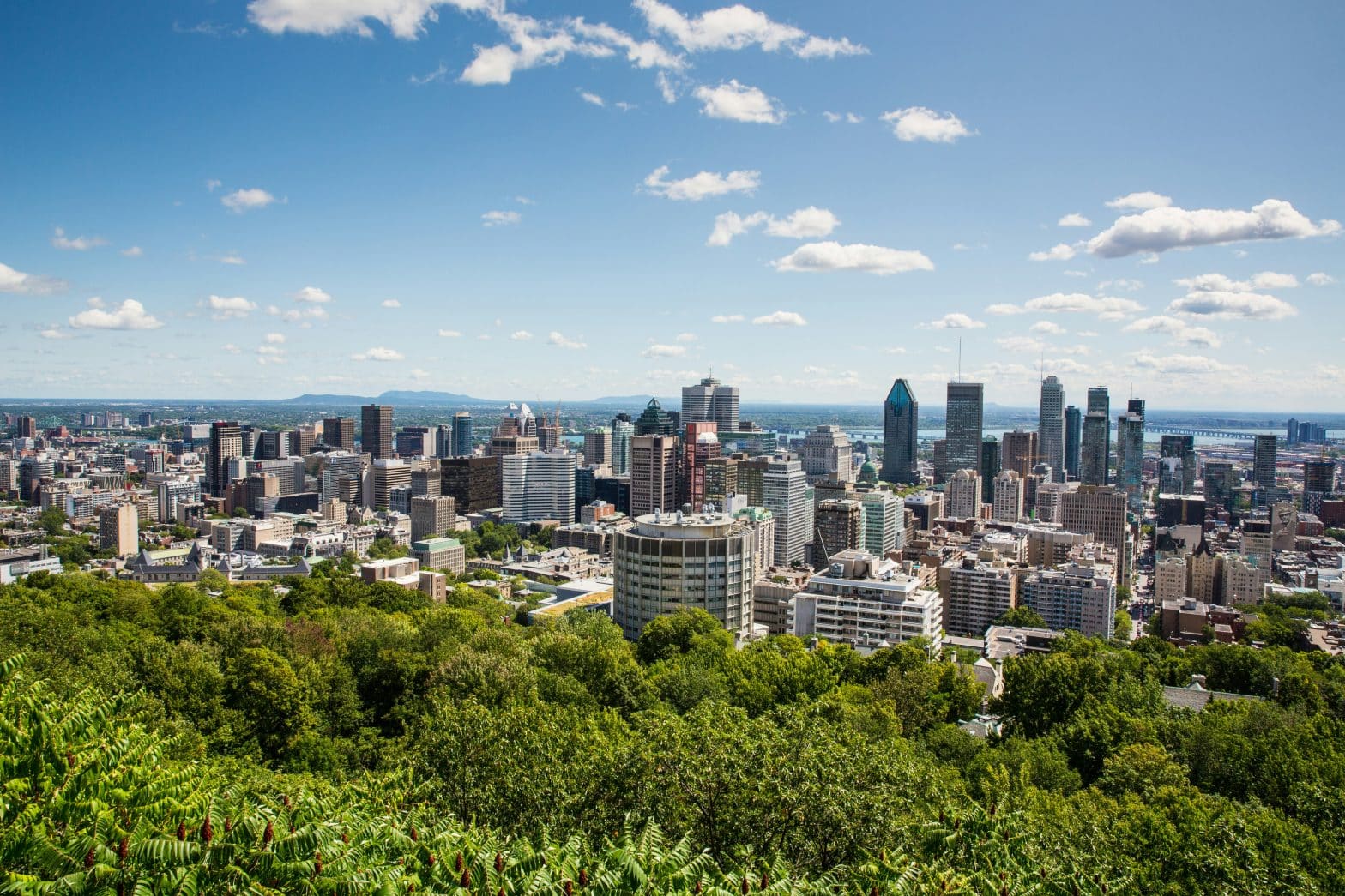If there is one city in North America that appeals to not only French-speaking expats, it is Montreal. The beating heart of Quebec, it attracts many foreigners every year.
Perhaps you have stayed there on holiday or a business trip and are considering moving there? Even if the language is not familiar to you, Montreal has its own specific characteristics.
Administrative formalities, housing, cost of living, schools for children … in this guide, Foyer Global Health tells you everything you need to know to make your relocation to Montreal a success!
Living in Montreal: Pros and Cons
Pros
- A dynamic job market
- A city of nature par excellence with more than 1,495 parks
- Lush natural surroundings (Parc du Mont-Tremblant, La Mauricie, etc.)
- No language barrier: Montrealers speak Quebec French as well as English
- A cost of living lower than the average for large Canadian cities (Toronto, Vancouver, Quebec City, etc.)
- Good purchasing power
- A city where gastronomy is in the spotlight: both Quebecois and international, thanks to its strong cultural diversity
Cons
- More than 7 hours 30 minutes by plane to reach Europe (but only 1 hour 40 minutes from New York!)
- Harsh Quebec winters
- Fewer holidays than in Europe: from 2 to 4 weeks depending on how long you have been with the same employer.

Administrative procedures for moving to Montreal
If you are European, you can stay in Canada without a visa for 6 months. Before travelling, you must have an Electronic Travel Authorisation (ETA) after applying for it on Canada.ca.
Otherwise, you must apply for a Temporary Resident Visa (TRV), also known as a ‘visitor visa’, on the official website of the Canadian government. This is valid for 6 months.
During this period, whether or not you needed a visa, you must apply for permanent residence in Quebec. This involves two stages:
- Obtain a Quebec Selection Certificate (CSQ): to do so, go to the Arrima website. You will need to create a profile, fill in the application form and provide the necessary documents (passport, diploma, etc.).
- Applying for permanent residence: once you have obtained the CSQ, you can make an official application for permanent residence, but this time to the federal government. For more information, please visit the website of the Quebec government.

Accommodation in Montreal
Where to live?
The city of Montreal is divided into 19 boroughs. Plateau-Mont-Royal is home to several neighbourhoods favoured by expatriates. There are three main neighbourhoods:
- Plateau Mont-Royal, of the same name
- Mile End
- Milton Park
The boroughs of Ville-Marie and Le Sud-Ouest also have neighbourhoods that are of interest to expats, such as Griffintown, 15 minutes from downtown Montreal, or Saint-Henri, a neighbourhood with a vibrant culture, popular with young people.
Which accommodation to choose and at what price?

You can find many types of accommodation in Montreal, mainly unfurnished apartments, although furnished apartments are also available.
PFor a spacious house, you will need to move slightly away from the city centre and look to the outlying districts.
As far as the budget to be planned is concerned, here are the average current rents in Montreal:
For a one-bedroom apartment: 850 to 1,150 euros
For a three-bedroom apartment: 1,300 to 1,825 euros
If you want to become a homeowner, the price per square metre is between 3,800 and 5,900 euros.
The cost of living in Montreal
To live in Montreal, a single person needs a monthly budget of about 1,800 euros. This includes rent and the main expenses: shopping, health, education and leisure. For an expatriate family, this budget amounts to 4,800 euros per month. The cost of living in Montreal remains more affordable than in other major Canadian cities such as Toronto, Victoria or Vancouver.
For more information, see our guide to the cost of living in Canada.
Getting around in Montreal: instructions for use
Public transport
Travelling is mainly by metro and bus, two interconnected networks managed by the Société de transport de Montréal (STM). We recommend downloading the STM app, which makes it much easier to plan your journeys in real time by showing the shortest routes and nearby stations and stops.
For your daily commute, especially your journey to work, the best option is to opt for the Opus card, a rechargeable card that you can use to pay for your journeys.
Driving in Montreal
As well as public transport, expats can also travel by car. If you are an EU citizen, your driving licence is valid for 6 months in Quebec. After this period, you will need to obtain a Canadian driving licence.
You can use your own vehicle or opt for a car-sharing service such as Communauto, which allows you to rent a car by the day or for a specific journey.

Moving to Montreal with your family: what you need to know
Children’s schooling
In Canada, each province has its own education system. In Quebec, although English is taught, classes are mainly given in French and schooling is divided as follows:
- Preschool: from 4 or 5 years old
- Primary: from 6 to 12 years old
- Secondary education: from 12 to 17 years old
- College: from 17 years old
- University (higher education)

Young children can be placed in daycare in Quebec from the age of 1 month to 5 years. It is recommended that they be enrolled as early as possible, as waiting lists can be long, especially in Montreal.
Outings and activities: one giant playground
The least we can say is that Montreal and its surroundings are full of activities for the whole family. With more than 6,412 hectares of green space, each neighbourhood in the city offers numerous playgrounds for children.
In summer, the Quartier des spectacles hosts numerous events. In the Vieux-Port, there are several family activities to discover, such as the aerial courses at the Voiles en Voiles adventure park.
For weekends and holidays, Quebec is full of natural treasures to explore with the family:
- Discovering the old town of Quebec with the children
- Taking a cruise on the St. Lawrence River
- Admire the Montmorency Falls (less well known than Niagara Falls, but just as impressive!)
- Skiing at Mont-Tremblant
Getting the family kitted out for winter
To live in Canada, and more specifically in Quebec, you have to be prepared to face the cold!
In Montreal, you will discover the first snows, maple taffy, tobogganing and snowshoeing … but the whole family must dress warmly to face temperatures that can drop to -15°C!
A good winter coat, waterproof boots, a tuque (hat) and a balaclava are essential. For children, also consider snow pants and gloves so they can play outside while being protected.

Working in Montreal
Obtaining a work permit
To be able to work in Canada, you must obtain a work permit. Several options are available and depend on your case:
- If you have a valid job offer from a Canadian company, it is up to your employer to take the necessary steps to obtain the work permit.
- If you are European, aged between 18 and 35, you can also apply for a Working Holiday Permit (WHP). The WHP allows you to work in Quebec for a period of 12 months.
- If you are the spouse of a worker or a graduate of a Canadian institution, you can also apply for an open work permit (for a maximum period of three years).
The Montreal job market
Quebec has the lowest unemployment rate in the country, with a stable employment sector, particularly in Montreal.

Companies in the tertiary sector are recruiting heavily, and job offers are multiplying, particularly in the following fields:
- Enseignement
- Santé (infirmiers, sage-femmes, médecins…)
- Travail social
- Intelligence artificielle
- Services professionnels
If you are looking for a job, you can consult Emploi Québec or the job centre on the official website of the Government of Canada. As everywhere else, having several years of professional experience is an added value in the eyes of recruiters.
The healthcare system in Quebec
The Canadian healthcare system is highly developed and recognised for its quality. Each province has its own health insurance system, such as the RAMQ, the Régie de l’assurance maladie du Québec.
As soon as you arrive, you and your family can register. Please note: if you have a Working Holiday Visa, you are not eligible for the Québec health insurance plan.
In Montreal, you will benefit from high-quality care provided by state-of-the-art medical facilities, including:
- The Centre hospitalier de l’Université de Montréal (CHUM)
- The Hôpital Général de Montréal
- The Hôpital du Sacré-Cœur-de-Montréal
Protect yourself with international private health insurance
Whether or not you meet the eligibility requirements, we recommend that you take out international private health insurance.
For expats, this option offers numerous benefits:
- Quick access to care, with reduced waiting times
- Coverage for various types of care (dental, ophthalmological, etc.), valid in Canada and all over the world
- Repatriation in case of emergency
